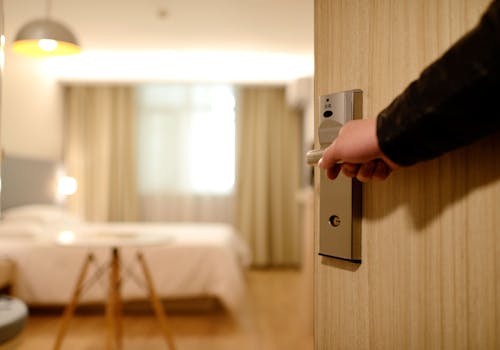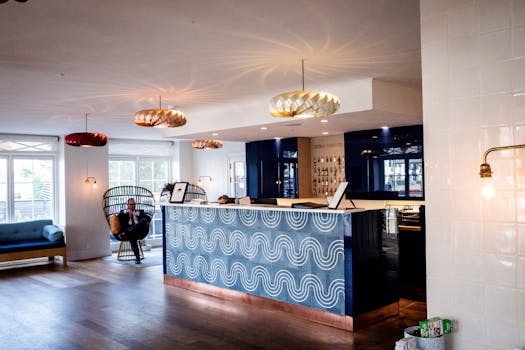You can take a college course before you look for work, like:
- introduction to the hospitality industry
- customer service
Entry requirements
Entry requirements for these courses vary.
A concierge works primarily in hotels, luxury apartment buildings, and other hospitality settings, helping guests or residents with a range of services. Duties can include booking transport and tickets, recommending local attractions, handling special requests, arranging deliveries, and providing information about the surrounding area. Good communication, local knowledge, and a friendly attitude are important in this role. Concierges are often the first point of contact for guests, so professionalism and problem-solving skills are essential.

The average salary for a concierge in the UK ranges from £18,000 to £25,000 per year, depending on experience and location.
There are approximately 1,500 to 2,000 concierge positions available in the UK at any given time, especially in major cities and tourist destinations.
Concierges often work shifts, including evenings, weekends, and public holidays, with full-time hours typically ranging from 37 to 40 hours per week.

Focuses on ensuring hotel guests have a pleasant stay by handling special requests, solving issues, and providing personalised recommendations.

Works in office buildings or for large companies, assisting employees and visitors with travel arrangements, event planning, and personal errands.
Provides front-desk support and lifestyle services for residents in high-end apartment buildings, including booking services and organising deliveries.
Finish your GCSEs, with a focus on English and maths.
Most employers look for candidates who have at least GCSEs, especially in English and maths, as they are important for communication and numeracy in the workplace. Some schools offer courses in travel and tourism, which can also be helpful.
Take a college course in hospitality, travel and tourism, or customer service.
While not always required, a Level 2 or 3 Diploma in Hospitality, Customer Service, or a similar subject can give you an advantage. These courses teach you about the industry and develop your people skills.
Work in a role where you interact with customers, such as a receptionist, retail assistant, or waiter.
Experience working with people is highly valued. Jobs in shops, restaurants, or hotels will help you develop communication and problem-solving skills, both of which are essential for a concierge.
Apply for entry-level positions in hotels, like porter or front desk assistant.
Starting in an entry-level hotel position gives you hands-on experience with guests and familiarises you with how hotels operate. Look for part-time or seasonal roles while you are still studying if possible.
Familiarise yourself with local attractions, restaurants, and transport options.
A good concierge is an expert in their local area. Build a mental list of recommendations for guests, such as places to eat, visit, and shop. Keeping up to date with local events can also set you apart.
Apply for jobs as a concierge in hotels, luxury apartments, or offices.
Once you have the right experience and skills, look for concierge job openings. Tailor your CV to highlight your customer service achievements and local knowledge. Some employers may offer on-the-job training or progression routes.
Explore relevant apprenticeships that can help you kickstart your career in Concierge. Apprenticeships offer hands-on experience and training while earning a wage.
This page showcases various career options and the pathways to reach them. Each career listed here shares transferable skills and knowledge, making it easier for individuals to transition between them.
Your current career is highlighted to help you see how it fits into the broader landscape of potential career choices. By clicking on any career, you can learn more about it, including the training and education required to pursue it.
Remember, progressing in your career often involves further learning and training. This page provides insights into future career options as well as those that can lead up to your current one.
These career progression decisions are informed by comparing the skills and knowledge needed for different occupations, along with data on how people move between them. Explore the possibilities and discover the exciting journey ahead in your career!
A Concierge and a Hotel porter both operate within the hospitality industry, providing assistance and services directly to guests. While a Concierge generally offers personalised services such as reservations and local information, a Hotel porter primarily assists with luggage and guest transport, making their roles complementary in ensuring a positive guest experience.
You can get into this job through:
You can take a college course before you look for work, like:
Entry requirements for these courses vary.
You can apply to do a Hospitality Accommodation Team Member Level 2 Intermediate Apprenticeship, with a hotel.
This usually takes 1 year to complete and combines on-the-job training and study with a learning provider.
You'll usually need:
You could start work as a kitchen assistant, cleaner or part of the bar staff in a hotel and switch to become a porter once you have some experience in the hospitality industry.
You can apply directly to hotel companies for jobs. Experience in customer service will be very useful though not always essential, as you will get training once you start.
Employers will be interested in your personal qualities and will expect you to be hardworking, honest and a reliable timekeeper.
Explore other careers or use our AI to discover personalised paths based on your interests.
Address
Developing Experts Limited
Exchange Street Buildings
35-37 Exchange Street
Norwich
NR2 1DP
UK
Phone
01603 273515
Email
[email protected]
Copyright 2025 Developing Experts, All rights reserved.
Unlock expert-designed lessons, resources, and assessments tailored for educators. No credit card required.
Claim Your Free Trial →